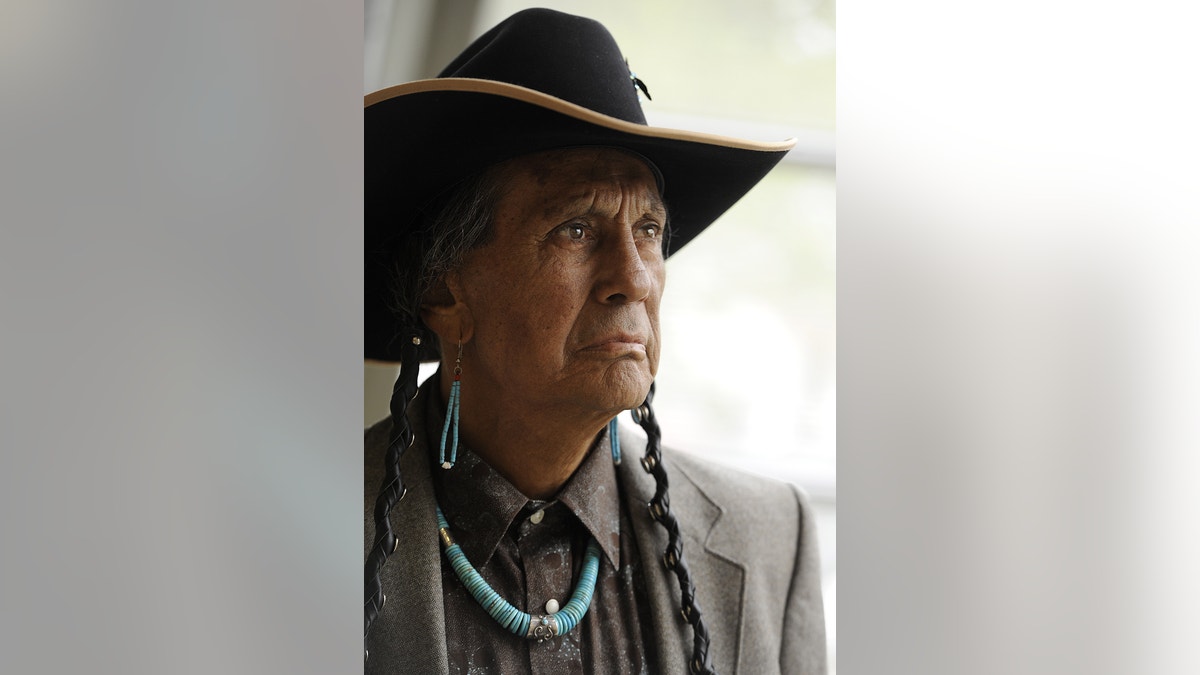
April 27, 2012 FILE photo - Russell Means, former leader of the American Indian Movement at Augustana College in Sioux Falls, S.D. (AP)
SIOUX FALLS, South Dakota – Russell Means, a former American Indian Movement activist who helped lead a 1973 uprising against the U.S. government and appeared in several Hollywood films, has died. He was 72.
Means died early Monday at his ranch in South Dakota, Oglala Sioux Tribe spokeswoman Donna Solomon said.
Means announced in August 2011 that he had developed inoperable throat cancer. He told The Associated Press he was forgoing mainstream medical treatments in favor of traditional American Indian remedies and alternative treatments away from his home on the Pine Ridge Indian Reservation.
Means led AIM's armed occupation of the South Dakota town of Wounded Knee, a 71-day siege that included several gun battles with federal officers. AIM was founded in the late 1960s to protest the U.S. government's treatment of Native Americans and demand the government honor its treaties with Indian tribes.
Means told the AP in 2011 that before AIM, there had been no advocate on a national or international scale for American Indians and that Native Americans were ashamed of their heritage.
"No one except Hollywood stars and very rich Texans wore Indian jewelry," Means said. "That's all changed."
He was often embroiled in controversy, partly because of AIM's alleged involvement in a 1975 killing. But Means was also known for his role in the movie "The Last of the Mohicans" and his unsuccessful run for the Libertarian nomination for president in 1988.
Paul DeMain, publisher of Indian Country Today, there plenty of Indian activists existed before AIM, but the group became the "radical media gorilla."
"If someone needed help, you called on the American Indian Movement and they showed up and caused all kind of ruckus and looked beautiful on a 20-minute clip on TV that night," DeMain said.
Means said he felt his most important accomplishment was the founding of the Republic of Lakotah and the "re-establishment of our freedom to be responsible" as a sovereign nation inside the borders of the United States. His efforts to have his proposed country recognized by the international community continued at the United Nations, he said, even as it was ignored by tribal governments closer to home, including his own Oglala Sioux Tribe.
But others may remember him for his former organization's connection to the killing of Annie Mae Aquash, whose death remains synonymous with AIM and its often violent clashes with federal agents in the 1970s.
Authorities believe three AIM members shot and killed Aquash on the Pine Ridge reservation on the orders of someone in AIM's leadership because they suspected she was an FBI informant. Two activists -- Arlo Looking Cloud and John Graham -- were eventually convicted of murder. The third has never been charged.
Means blamed Vernon Bellecourt, another AIM leader, for ordering Aquash's killing. Bellecourt denied the allegations in a 2004 interview, four years before he died.
Also in 1975, murder charges were filed against Means and Dick Marshall, an AIM member, in the shooting death of Martin Montileaux at the Longbranch Saloon. Marshall served 24 years in prison. Means was acquitted.
Means also briefly served as a vice presidential candidate in 1984, joining the Larry Flynt ticket during the Hustler magazine publisher's unsuccessful bid for the Republican nomination.
But Means always considered himself a Libertarian and couldn't believe that anyone would want to identify as either a Republican or a Democrat.
"It's just unconscionable that America has become so stupid," he said.
His acting career began in 1992, when he portrayed Chingachgook alongside Daniel Day-Lewis' Hawkeye in "The Last of the Mohicans." He also appeared in the 1994 film "Natural Born Killers," voiced Chief Powhatan in the 1995 animated film "Pocahontas" and guest starred in 2004 on the HBO series "Curb Your Enthusiasm."
Means recounted his life in the book "Where White Men Fear to Tread." He admitted to his frailties and evils but also acknowledging his successes.
"I tell the truth, and I expose myself as a weak, misguided, misdirected, dysfunctional human being I used to be," he said.

